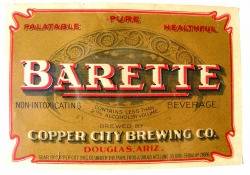Prohibition in Arizona

1914 Copper City Near Beer Label
As the new century approached, prohibitionists made significant inroads to fulfilling their dream of having a dry nation. The Dry's viewed alcohol as the root of all evil, immorality, sin, and iniquity. In 1915, they triumphed in making Arizona dry and forced the closure of the state’s two operating breweries along with hundreds of saloons and related businesses.
National Prohibition took effect on January 16, 1920, one year after the requisite number of states had ratified the 18th amendment to the U. S. Constitution, and a few months after Congress passed the Volstead Act. For more than 13 years the manufacture, sale, or transport of alcohol in the United States was illegal. Thousands of breweries closed. Among the unintended consequences of prohibition was bootlegging, increased drug experimentation, health issues, and a rise in crime, which eventually led to Prohibition's repeal in 1933.
National Prohibition took effect on January 16, 1920, one year after the requisite number of states had ratified the 18th amendment to the U. S. Constitution, and a few months after Congress passed the Volstead Act. For more than 13 years the manufacture, sale, or transport of alcohol in the United States was illegal. Thousands of breweries closed. Among the unintended consequences of prohibition was bootlegging, increased drug experimentation, health issues, and a rise in crime, which eventually led to Prohibition's repeal in 1933.
